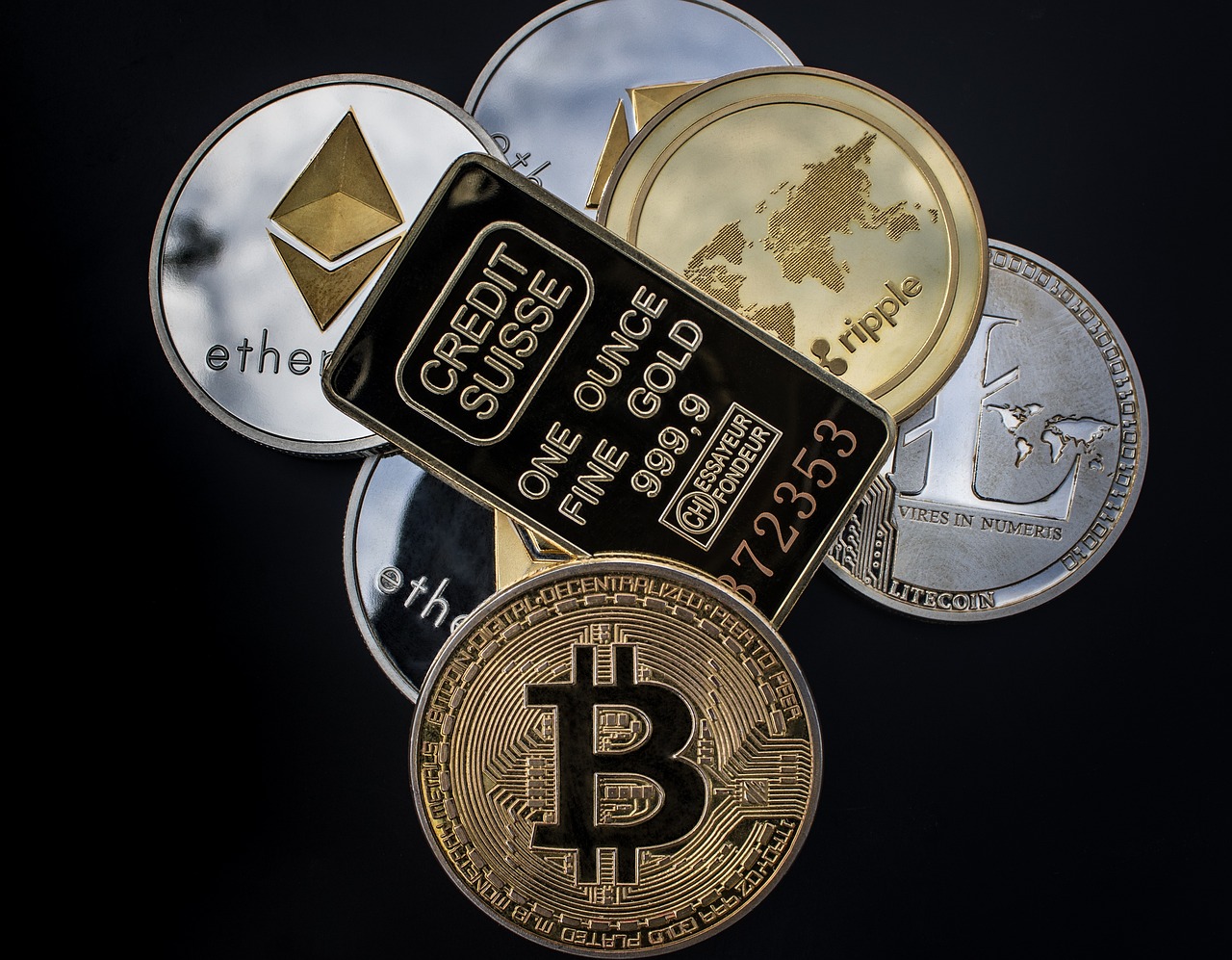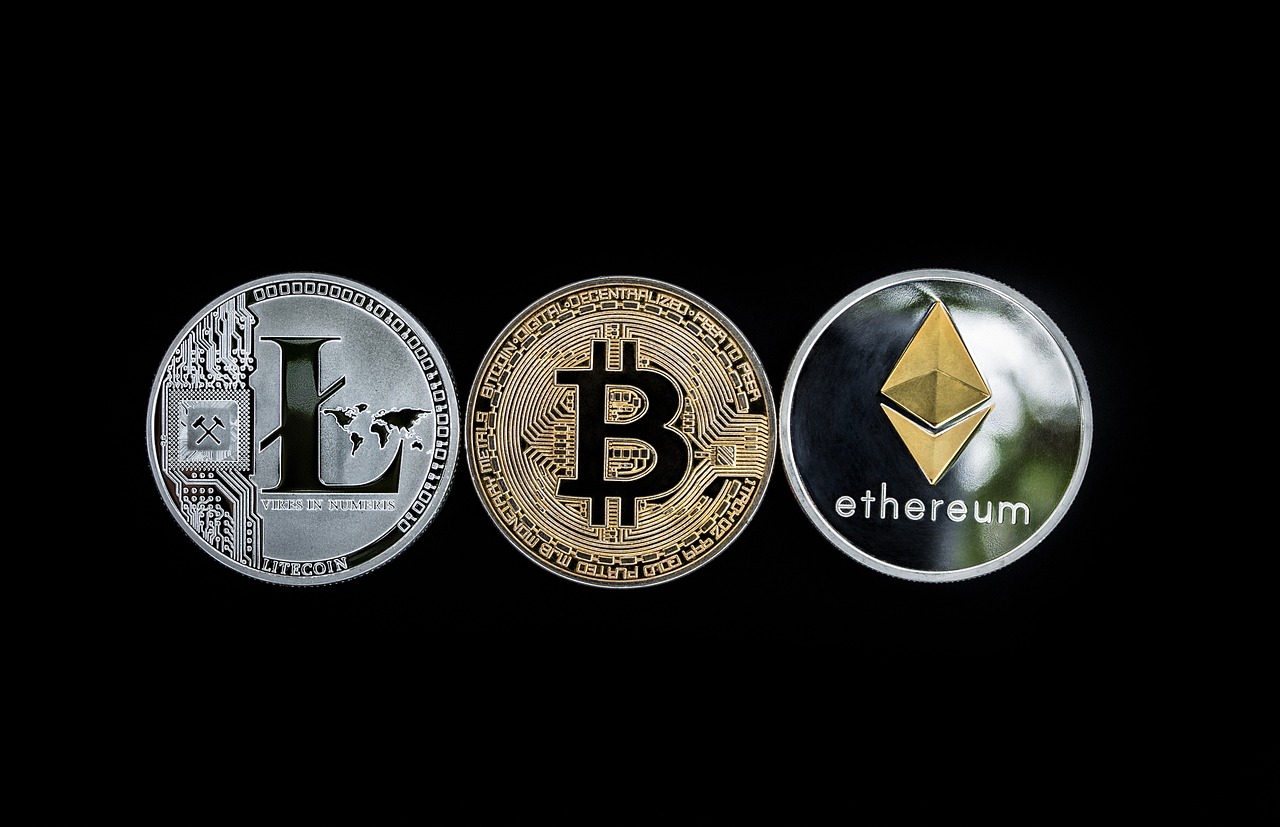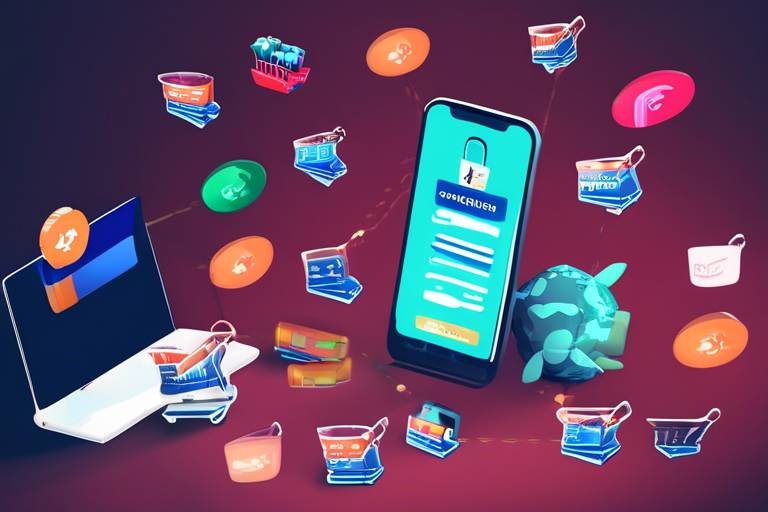The Role of Blockchain in Enhancing Supply Chain Efficiency
In today's fast-paced world, the efficiency of supply chains can make or break a business. Imagine a world where every product's journey—from raw materials to the final consumer—is transparent, traceable, and secure. This is where blockchain technology comes into play. By leveraging the power of a decentralized ledger, businesses can streamline their operations, reduce costs, and foster a culture of trust among all stakeholders involved. So, how does this technology work its magic, and what does it mean for the future of supply chains? Let's dive in!
At its core, blockchain is a revolutionary technology that offers a secure and transparent method of record-keeping. Think of it as a digital ledger that is not controlled by a single entity. Instead, it is distributed across a network of computers, making it virtually tamper-proof. Each transaction is recorded in a "block," and once a block is filled, it is linked to the previous one, forming a "chain." This structure ensures that once data is entered, it cannot be altered or deleted without the consensus of the network. Understanding these core principles is essential for grasping how blockchain can transform supply chain management.
The implementation of blockchain in supply chains is not just a trend; it offers a plethora of benefits that can revolutionize the way businesses operate. From increased transparency to improved traceability, the advantages are both compelling and transformative. Here are some key benefits:
- Increased Transparency: Everyone involved in the supply chain has access to the same information, reducing misunderstandings and fostering collaboration.
- Improved Traceability: Products can be tracked in real-time, providing stakeholders with accurate information about the origin and journey of goods.
- Enhanced Security: With an immutable record of transactions, the risk of fraud is significantly reduced, protecting both businesses and consumers.
One of the standout features of blockchain is its ability to offer real-time tracking of products throughout the supply chain. Imagine a consumer being able to scan a QR code on their product and instantly see its entire journey—from the farm where it was produced to the store shelf where it was purchased. This level of transparency not only empowers consumers but also builds trust in the brand. Stakeholders can access accurate information about the origin and journey of goods, which is crucial in industries like food and pharmaceuticals, where safety is paramount.
Fraud in supply chains can lead to significant financial losses and damage to reputations. However, blockchain technology provides an immutable record of transactions. This means that once a transaction is recorded, it cannot be altered, making it incredibly difficult for fraudsters to manipulate data. By ensuring that all transactions are transparent and verifiable, businesses can protect themselves and their customers from fraudulent activities.
Compliance with regulations and standards is a daunting task for many businesses. Fortunately, blockchain can streamline this process by providing verifiable records of transactions. When all parties have access to the same data, it becomes much easier for companies to adhere to regulations and standards. This not only saves time but also reduces the risk of costly penalties associated with non-compliance.
The transparent nature of blockchain is perhaps its most significant advantage. With all parties in the supply chain able to access the same information, there is a natural reduction in misunderstandings and disputes. This transparency fosters a culture of trust and collaboration among stakeholders, which is essential for smooth operations. When businesses can trust one another, they can work together more effectively, leading to enhanced efficiency and reduced costs.
Despite its numerous advantages, implementing blockchain in supply chains is not without its challenges. Issues such as scalability, integration with existing systems, and the need for industry-wide standards can pose significant hurdles. Understanding these challenges is crucial for companies looking to adopt this technology.
As transaction volumes grow, scalability becomes a critical concern for blockchain networks. Businesses must develop solutions to ensure that their systems can handle increased loads without sacrificing performance. This requires careful planning and investment in technology to maintain efficiency as the supply chain expands.
Integrating blockchain with existing supply chain systems can be complex. Many businesses have legacy systems that may not be compatible with blockchain technology. It requires careful planning and execution to ensure seamless operation and data flow. Companies must invest time and resources in training and adapting their workforce to effectively utilize this new technology.
- What is blockchain? Blockchain is a decentralized digital ledger that securely records transactions across a network of computers.
- How does blockchain improve supply chain efficiency? By providing real-time tracking, increased transparency, and enhanced security, blockchain streamlines operations and fosters trust among stakeholders.
- What are the challenges of implementing blockchain? Key challenges include scalability, integration with legacy systems, and the need for industry-wide standards.

[Understanding Blockchain Technology]
Blockchain technology is often described as a decentralized ledger, but what does that really mean? Imagine a digital notebook that everyone in a group can see and write in, but no one can erase or alter what’s already been written. This is the essence of blockchain—a system where every transaction is recorded in a way that is both secure and transparent. It operates on a network of computers, known as nodes, which all hold copies of the same ledger. When a transaction occurs, it is verified by the network and added to the blockchain as a new 'block' of data, hence the name. This process is not only efficient but also ensures that all participants have access to the same information, fostering a sense of trust among them.
To truly grasp the transformative power of blockchain in supply chain management, we need to delve into its core principles. At its foundation, blockchain is built on three key characteristics:
- Transparency: All transactions are visible to everyone on the network, which helps in building trust and accountability.
- Immutability: Once a transaction is recorded, it cannot be changed or deleted, reducing the risk of fraud.
- Decentralization: There is no central authority governing the blockchain, which minimizes the chances of manipulation or corruption.
These principles not only enhance the integrity of the data but also streamline operations significantly. In a traditional supply chain, information is often siloed, leading to delays and inefficiencies. With blockchain, however, every participant—from manufacturers to retailers—can access real-time data. This means that if a product is delayed, everyone is notified instantly, allowing for quicker decision-making and problem resolution.
Furthermore, blockchain's ability to create a secure and permanent record of transactions means that companies can track their products from the point of origin to the final consumer. This level of traceability is crucial in today’s market, where consumers are increasingly concerned about the ethical sourcing of products. Imagine being able to scan a QR code on your food package and instantly see its entire journey, from farm to table. This not only enhances consumer trust but also empowers companies to verify their supply chains, ensuring compliance with regulations and standards.
In summary, understanding blockchain technology is essential for anyone looking to enhance supply chain efficiency. Its decentralized, transparent, and immutable nature offers a revolutionary approach to managing supply chains, paving the way for improved operations and greater trust among stakeholders. As we continue to explore the benefits of blockchain, it's clear that this technology is not just a trend; it's a fundamental shift in how we conduct business.

[Benefits of Blockchain in Supply Chain]
Implementing blockchain technology in supply chains is not just a trend; it's a game-changer that brings a plethora of benefits to the table. Imagine a world where every product's journey is documented with precision, where trust is built on transparency, and where operational costs are slashed. That's the promise of blockchain in supply chain management. By leveraging this innovative technology, businesses can enhance their operations in ways that were previously unimaginable.
One of the most significant advantages of blockchain is its ability to provide increased transparency. In a traditional supply chain, information is often siloed, leading to discrepancies and mistrust among stakeholders. However, with blockchain, all parties involved—from suppliers to consumers—can access the same immutable records. This transparency not only fosters collaboration but also enables quicker decision-making. When everyone has access to the same data, misunderstandings diminish, and trust flourishes.
Moreover, blockchain enhances traceability. Imagine being able to track a product from its origin to the consumer's hands in real time. This feature is invaluable, especially in industries like food and pharmaceuticals, where knowing the source of a product can be a matter of safety. With blockchain, each transaction is recorded in a secure, decentralized ledger, allowing stakeholders to trace the product's journey effortlessly. This level of traceability not only reassures consumers but also aids companies in quickly addressing any issues that may arise.
Another critical benefit of blockchain is its capacity for reducing fraud. In a world where counterfeit products can easily infiltrate the market, blockchain acts as a fortress. By providing an immutable record of every transaction, it becomes nearly impossible for fraudulent activities to go unnoticed. This security is crucial for both businesses and consumers, as it protects brand integrity and ensures that customers receive genuine products.
Furthermore, blockchain can significantly enhance compliance within the supply chain. Regulatory requirements are constantly evolving, and companies often struggle to keep up. However, with blockchain, maintaining compliance becomes more manageable. The technology provides verifiable records of transactions that can be easily audited, making it simpler for businesses to adhere to regulations and industry standards. This not only saves time but also reduces the risk of costly penalties.
In addition to these benefits, blockchain can lead to cost reductions. By streamlining processes, reducing fraud, and improving traceability, companies can save on operational costs. For instance, the elimination of intermediaries can significantly lower transaction fees, while enhanced efficiency can lead to faster delivery times and reduced inventory costs. In a competitive market, these savings can make a substantial difference.
In conclusion, the benefits of implementing blockchain in supply chains are vast and varied. From increased transparency and improved traceability to enhanced security and compliance, the technology offers solutions that address many of the challenges faced by traditional supply chains. As businesses continue to seek ways to optimize their operations, blockchain stands out as a powerful tool that can drive efficiency and foster trust among all stakeholders.
- What is blockchain technology? Blockchain is a decentralized ledger system that records transactions across multiple computers, ensuring that the record is secure and cannot be altered retroactively.
- How does blockchain improve supply chain transparency? By providing a shared, immutable record of transactions, blockchain allows all stakeholders to access the same information, reducing discrepancies and fostering trust.
- Can blockchain help in reducing fraud? Yes, blockchain's immutable nature makes it difficult for fraudulent activities to occur, as every transaction is recorded and can be traced back.
- What industries can benefit from blockchain in supply chains? Industries such as food and beverage, pharmaceuticals, and manufacturing can greatly benefit from blockchain due to the need for traceability and compliance.

[Improved Traceability]
One of the most remarkable features of blockchain technology is its ability to provide real-time tracking of products throughout the supply chain. Imagine a world where you can trace the journey of your favorite coffee bean from the farm to your cup, or track the origin of the ingredients in your meal at a restaurant. With blockchain, this isn't just a dream—it's a reality! Each transaction and movement of goods is recorded on a decentralized ledger, ensuring that all stakeholders have access to accurate and up-to-date information.
This improved traceability is crucial for several reasons. Firstly, it enhances accountability. When every participant in the supply chain can see the history of a product, it becomes easier to identify where issues may have arisen. For instance, if a batch of food is contaminated, blockchain allows for quick identification of the source, enabling swift action to mitigate health risks. This capability is not only beneficial for consumers but also protects brands from potential damage to their reputation.
Furthermore, the ability to trace products back to their origin helps in verifying ethical sourcing. Consumers today are more conscious than ever about where their products come from. They want to know if the ingredients are sustainably sourced or if the workers involved are treated fairly. With blockchain, brands can provide transparent proof of their supply chain practices, fostering trust and loyalty among consumers.
In addition to these benefits, improved traceability also facilitates better inventory management. Companies can monitor stock levels in real-time, reducing the chances of overstocking or stockouts. This leads to more efficient operations overall and can significantly cut down costs. For example, a company utilizing blockchain might implement a system where products are automatically reordered when they reach a certain threshold, ensuring that they never run out of popular items.
To illustrate the impact of improved traceability, consider the following table that highlights the differences in traditional supply chains versus blockchain-enabled supply chains:
| Aspect | Traditional Supply Chain | Blockchain-Enabled Supply Chain |
|---|---|---|
| Data Access | Limited to individual stakeholders | Accessible to all authorized parties |
| Traceability | Often manual and time-consuming | Real-time and automated |
| Fraud Prevention | Reactive measures | Proactive through immutable records |
| Consumer Trust | Often questioned | Enhanced through transparency |
In summary, improved traceability through blockchain technology is not just about knowing where products come from; it's about building a more efficient, transparent, and trustworthy supply chain. As businesses continue to adopt this technology, we can expect to see significant changes that benefit not only companies but also consumers and the environment alike.
- What is blockchain technology?
Blockchain is a decentralized digital ledger that records transactions across many computers in a way that the registered transactions cannot be altered retroactively.
- How does blockchain improve traceability?
By providing a transparent and immutable record of transactions, blockchain allows all stakeholders to track the movement of products in real-time.
- Can blockchain prevent fraud in the supply chain?
Yes, the immutable nature of blockchain records significantly reduces the risk of fraud by ensuring that all transactions are verifiable and cannot be altered.
- What industries can benefit from blockchain?
While supply chains are a major area, industries such as healthcare, finance, and logistics can also greatly benefit from blockchain technology.

[Reducing Fraud]
In today's fast-paced market, fraud poses a significant threat to supply chains, affecting everything from product integrity to consumer trust. Imagine a world where every product's journey is recorded in a way that is tamper-proof and accessible to all stakeholders. This is where blockchain technology steps in, acting as a guardian against fraud. By creating an immutable record of transactions, blockchain ensures that once data is entered, it cannot be altered or deleted. This characteristic is crucial for maintaining the authenticity of products and the integrity of the supply chain.
Consider the case of counterfeit goods, which have become increasingly prevalent in various industries, from luxury fashion to pharmaceuticals. With blockchain, each product can have a unique digital identity, linked to its origin and journey through the supply chain. This means that consumers can verify the authenticity of their purchases easily. For instance, a simple scan of a QR code on a product can reveal its entire history, including where it was manufactured, how it was transported, and even the conditions it was stored in. This level of transparency not only deters fraud but also empowers consumers to make informed choices.
Furthermore, the decentralized nature of blockchain means that no single entity controls the data. This distribution of information across a network of computers makes it nearly impossible for fraudsters to manipulate records without detection. For example, if a supplier attempts to falsify shipment details, the discrepancy would be easily identified by other parties in the network, triggering alerts and investigations. The collaborative aspect of blockchain fosters a culture of accountability, where stakeholders are encouraged to uphold ethical practices.
To illustrate the impact of blockchain in reducing fraud, consider the following table that highlights key advantages:
| Advantage | Description |
|---|---|
| Immutable Records | Once data is recorded on the blockchain, it cannot be changed or deleted, ensuring authenticity. |
| Real-Time Tracking | Stakeholders can monitor the movement of goods in real-time, identifying any irregularities quickly. |
| Decentralization | No single entity controls the data, reducing the risk of manipulation and fraud. |
| Consumer Empowerment | Consumers can verify product authenticity, leading to increased trust in brands. |
In summary, blockchain technology serves as a powerful tool in the fight against fraud in supply chains. By ensuring that every transaction is transparent and verifiable, it not only protects businesses from financial losses but also builds a stronger relationship between companies and their customers. As we move forward, the adoption of blockchain could very well redefine the standards of trust and integrity in supply chain management.
- How does blockchain prevent fraud? Blockchain prevents fraud by creating an immutable record of transactions that cannot be altered or deleted.
- Can consumers verify product authenticity using blockchain? Yes, consumers can verify product authenticity by scanning a QR code linked to the product's blockchain record.
- What industries benefit most from blockchain in reducing fraud? Industries such as pharmaceuticals, luxury goods, and food supply chains benefit significantly from blockchain technology.

[Enhancing Compliance]
In the ever-evolving landscape of global trade, compliance with regulations and standards is paramount. Blockchain technology emerges as a powerful ally in this regard, offering a robust solution for businesses striving to maintain compliance across their supply chains. By leveraging the immutable and transparent nature of blockchain, organizations can create verifiable records of every transaction, making it significantly easier to demonstrate adherence to various regulations.
Imagine the traditional compliance process as a maze—complicated, time-consuming, and often fraught with errors. With blockchain, that maze transforms into a straight path, where each step is clearly documented and easily accessible. This is particularly beneficial in industries such as food and pharmaceuticals, where stringent regulations are in place to ensure consumer safety. For instance, if a food product is found to be contaminated, blockchain allows for rapid tracing back to the source, enabling swift action to mitigate risks.
Moreover, the transparency provided by blockchain enhances the ability of regulatory bodies to conduct audits and inspections. When all parties involved in the supply chain can access the same data in real-time, discrepancies can be identified and resolved much more quickly. This level of transparency not only facilitates compliance but also builds trust among stakeholders, from manufacturers to consumers. In essence, blockchain serves as a digital ledger that everyone can rely on, reducing the likelihood of disputes and enhancing collaboration.
To illustrate the impact of blockchain on compliance, consider the following table that outlines key benefits:
| Benefit | Description |
|---|---|
| Real-Time Record Keeping | Ensures that all transactions are logged in real-time, providing an up-to-date view of compliance status. |
| Immutable Records | Once data is entered into the blockchain, it cannot be altered, ensuring integrity and reliability. |
| Easy Auditing | Facilitates straightforward audits by providing a clear trail of all transactions. |
In conclusion, blockchain technology not only simplifies compliance processes but also transforms the way businesses approach regulatory requirements. By adopting blockchain, companies can ensure they remain compliant while simultaneously enhancing operational efficiency. As the world becomes increasingly interconnected, the ability to maintain compliance seamlessly will undoubtedly become a competitive advantage.
- What is blockchain technology?
Blockchain is a decentralized digital ledger that records transactions across multiple computers, ensuring that the recorded transactions cannot be altered retroactively.
- How does blockchain enhance compliance?
Blockchain enhances compliance by providing immutable records of transactions that are easily accessible and verifiable, facilitating audits and reducing the risk of discrepancies.
- Can blockchain be integrated with existing systems?
Yes, but it requires careful planning and execution to ensure seamless integration with legacy systems while maintaining data flow and operational efficiency.

[Increased Transparency]
In today’s fast-paced world, transparency is more than just a buzzword; it's a necessity. When it comes to supply chains, the ability to see through the layers of production and distribution is crucial for building trust among all stakeholders. Imagine a world where every participant in the supply chain—from manufacturers to consumers—can access the same up-to-date information about a product's journey. This is where blockchain technology shines, creating a level of clarity that was previously unimaginable.
With blockchain, every transaction is recorded on an immutable ledger, which means that once data is entered, it cannot be altered or deleted. This characteristic not only enhances accountability but also ensures that everyone involved can verify the authenticity of the information. For instance, if a retailer wants to confirm the origin of a product, they can trace it back through the blockchain, verifying every step it took to reach the store shelf. This kind of visibility is revolutionary and helps in building a more trustworthy relationship between businesses and consumers.
Moreover, the transparent nature of blockchain fosters collaboration among various parties in the supply chain. When everyone has access to the same information, it reduces the chances of misunderstandings and disputes. For example, if a shipment is delayed, all stakeholders can see the real-time status of the shipment, allowing them to adjust their plans accordingly. This level of transparency not only streamlines operations but also enhances the overall efficiency of the supply chain.
To illustrate the impact of transparency in the supply chain, consider the following table:
| Aspect | Traditional Supply Chain | Blockchain-Enabled Supply Chain |
|---|---|---|
| Data Access | Limited to certain stakeholders | Accessible to all relevant parties |
| Data Integrity | Prone to manipulation | Immutable records |
| Trust Level | Variable, often requires third-party verification | High, due to shared and verified data |
| Collaboration | Often siloed and competitive | Enhanced through shared information |
As we can see, blockchain technology significantly enhances transparency in supply chains, which in turn leads to improved trust and collaboration among all participants. This is especially important in industries where the provenance of goods is critical, such as food safety and pharmaceuticals. Consumers are increasingly demanding to know where their products come from, and blockchain provides the perfect solution to meet this demand.
In summary, the increased transparency offered by blockchain is not just a technological advancement; it's a fundamental shift in how we think about supply chain management. By allowing all stakeholders to access the same reliable information, blockchain fosters a culture of trust and collaboration that can lead to greater efficiency and reduced costs. As we continue to explore the potential of this technology, it’s clear that transparency will be a key driver of success in the future of supply chain operations.
- What is blockchain technology? Blockchain is a decentralized ledger that records transactions across multiple computers, ensuring that the recorded data cannot be altered retroactively.
- How does blockchain improve supply chain transparency? By providing a shared, immutable record of transactions that all stakeholders can access, blockchain enhances visibility and trust.
- Are there any challenges to implementing blockchain in supply chains? Yes, challenges include scalability, integration with existing systems, and the need for industry-wide standards.

[Challenges of Implementing Blockchain]
While the potential of blockchain technology in supply chain management is immense, it is not without its challenges. Implementing blockchain requires a careful approach to navigate the complexities that come with it. One of the primary hurdles is scalability. As the number of transactions increases, the blockchain must handle a higher load without compromising speed or efficiency. This means that solutions need to be developed to ensure that the network can scale effectively. Imagine a highway that becomes congested as more cars enter; similarly, a blockchain network can face delays if it isn't built to accommodate growth.
Another significant challenge is the integration with legacy systems. Many businesses have established supply chain processes that rely on traditional technologies. Integrating blockchain with these existing systems can be a daunting task. It's like trying to fit a square peg in a round hole; careful planning and execution are essential to ensure that data flows seamlessly between old and new systems. Companies must invest time and resources to train their staff and adapt their processes to incorporate blockchain technology.
Moreover, there is a pressing need for industry-wide standards. Currently, various blockchain platforms operate independently, which can lead to fragmentation. Without a common framework, it becomes challenging for different stakeholders to communicate effectively. This lack of standardization can create barriers to adoption, as companies may be hesitant to invest in a technology that doesn't have a clear path to interoperability. Picture a world where each country has its own currency, making international trade cumbersome; similarly, the absence of uniform standards can hinder the efficiency of blockchain in supply chains.
Finally, the cultural shift required for adopting blockchain technology cannot be overlooked. Stakeholders in the supply chain must be willing to embrace change and collaborate in ways they might not be accustomed to. This often involves breaking down silos and fostering a culture of transparency and trust. Just as a team needs to work together to win a game, all parties in the supply chain must align their goals and efforts to fully leverage the benefits of blockchain.
- What is blockchain technology? Blockchain is a decentralized ledger that securely records transactions across multiple computers, ensuring that the data cannot be altered retroactively.
- How does blockchain improve supply chain efficiency? By providing real-time visibility, traceability, and security, blockchain enhances transparency and reduces the risk of fraud, leading to more efficient operations.
- What are the main challenges of implementing blockchain in supply chains? Key challenges include scalability, integration with legacy systems, the need for industry standards, and fostering a cultural shift among stakeholders.
- Can blockchain be integrated with existing supply chain systems? Yes, but it requires careful planning and execution to ensure seamless operation and data flow.

[Scalability Issues]
When we talk about scalability in the context of blockchain, we’re diving into a critical aspect that can make or break its application in supply chains. Imagine a bustling market where every vendor needs to record each transaction instantly. If the market grows too big too fast, the vendors may struggle to keep up, leading to delays and inefficiencies. This analogy mirrors the challenges blockchain faces as transaction volumes increase. As more participants join the blockchain network, the demand for processing transactions in real-time escalates. If the system can't handle this growth, it risks becoming sluggish, which defeats the purpose of using such an advanced technology.
One of the main issues with scalability lies in the consensus mechanisms that blockchain networks use. Most traditional blockchains, like Bitcoin, rely on a process called Proof of Work, which, while secure, can be incredibly slow and energy-intensive. This delay can lead to longer transaction times, making it impractical for supply chains that require rapid updates. For instance, if a retailer needs to verify the origin of a product before it hits the shelves, a slow blockchain could hinder operations, causing potential losses.
To tackle these scalability challenges, several solutions are being explored. Here are some of the most promising approaches:
- Layer 2 Solutions: These are protocols built on top of the main blockchain that can process transactions more quickly and efficiently. Think of them as express lanes in a traffic system, allowing for faster movement without congesting the main road.
- Sharding: This involves splitting the blockchain into smaller, more manageable pieces, or "shards," that can process transactions simultaneously. This method can significantly increase the overall throughput of the network.
- Alternative Consensus Mechanisms: Exploring different consensus algorithms, such as Proof of Stake, can help improve transaction speeds and lower energy consumption, making blockchain more scalable.
However, implementing these solutions is not without its own set of challenges. Each method may introduce new complexities, such as security vulnerabilities or the need for additional infrastructure. Therefore, while the potential for scalable blockchain solutions exists, careful planning and execution are essential to ensure that the integrity and security of the supply chain are not compromised.
In conclusion, scalability is a vital consideration for blockchain technology in supply chains. Without addressing these issues, the full benefits of blockchain cannot be realized. As the industry continues to innovate, it will be fascinating to see how these challenges are overcome, paving the way for a more efficient and transparent supply chain ecosystem.
- What is blockchain scalability?
Blockchain scalability refers to the ability of a blockchain network to handle an increasing number of transactions without compromising performance.
- Why is scalability important for supply chains?
Scalability is crucial because supply chains often deal with high transaction volumes, and a scalable blockchain can ensure timely processing and real-time tracking of goods.
- What are some solutions to blockchain scalability issues?
Solutions include Layer 2 solutions, sharding, and exploring alternative consensus mechanisms like Proof of Stake.

[Integration with Legacy Systems]
Integrating blockchain technology with existing legacy systems presents a unique set of challenges that organizations must navigate carefully. Many businesses have invested heavily in their current systems, which are often outdated yet still functional. The thought of overhauling these systems to accommodate blockchain can be daunting. However, it’s essential to recognize that integration is not just about replacing old technology; it’s about enhancing and future-proofing operations.
One of the primary obstacles in this integration process is the disparity in technology. Legacy systems may rely on outdated programming languages or architectures that aren’t compatible with modern blockchain solutions. This incompatibility can lead to significant hurdles in data exchange and communication between systems. Therefore, organizations need to conduct a thorough assessment of their current systems to identify potential integration points and gaps.
Moreover, the complexity of the existing infrastructure can make the integration process seem overwhelming. To mitigate this, businesses can adopt a phased approach, starting with pilot projects that allow for gradual implementation. By doing so, organizations can test the waters, learn from initial implementations, and make necessary adjustments without a full-scale disruption. This strategy not only minimizes risks but also builds confidence among stakeholders.
Another critical factor to consider is the training and adaptation of personnel. Employees accustomed to legacy systems may resist change, fearing that new technologies will complicate their workflows. Therefore, investing in comprehensive training programs is vital. These programs should focus not only on how to use the new blockchain systems but also on the benefits they bring, such as improved efficiency and reduced errors. By fostering a culture of adaptability, organizations can smooth the transition and encourage collaboration.
Additionally, businesses should prioritize collaboration with technology partners who specialize in blockchain integration. These partners can offer valuable insights and technical expertise, helping to bridge the gap between legacy systems and new blockchain solutions. This collaboration can also lead to the development of custom solutions tailored to the organization’s specific needs, ensuring a more seamless integration process.
In conclusion, while integrating blockchain with legacy systems poses challenges, it also presents an opportunity for organizations to modernize their operations. By taking a strategic approach, investing in training, and collaborating with experts, businesses can unlock the full potential of blockchain technology, paving the way for enhanced efficiency and innovation.
- What are the main challenges of integrating blockchain with legacy systems? The main challenges include compatibility issues, complexity of existing infrastructure, and the need for employee training.
- How can organizations ensure a smooth integration process? Organizations can ensure a smooth process by adopting a phased approach, investing in training, and collaborating with technology partners.
- Is it necessary to replace legacy systems entirely to implement blockchain? No, it is not necessary to replace legacy systems entirely; integration can enhance existing systems without complete overhauls.
Frequently Asked Questions
- What is blockchain technology?
Blockchain technology is a decentralized ledger system that allows for secure and transparent record-keeping. It enables multiple parties to access the same information in real-time, ensuring that all transactions are recorded in an immutable way. This makes it particularly useful for enhancing supply chain efficiency.
- How does blockchain improve supply chain efficiency?
Blockchain enhances supply chain efficiency by providing increased transparency, improved traceability, and enhanced security. With blockchain, stakeholders can track products in real-time, reducing delays and errors, while also fostering trust among all parties involved.
- Can blockchain help reduce fraud in supply chains?
Absolutely! One of the key benefits of blockchain is its ability to provide an immutable record of transactions. This means that once information is recorded, it cannot be altered or deleted, significantly reducing the risk of fraud and ensuring that both businesses and consumers are protected.
- What are the challenges of implementing blockchain in supply chains?
Implementing blockchain can come with challenges such as scalability issues, the complexity of integrating with legacy systems, and the need for industry-wide standards. Companies must carefully plan and execute their blockchain strategies to overcome these obstacles and achieve successful implementation.
- Is blockchain technology scalable?
Scalability is a concern for many blockchain networks, especially as transaction volumes increase. Solutions are being developed to address these issues, ensuring that blockchain systems can handle larger loads without compromising performance or speed.
- How does blockchain enhance compliance in supply chains?
Blockchain streamlines compliance processes by providing verifiable records of transactions. This makes it easier for companies to adhere to regulations and industry standards, as all information is readily accessible and can be audited at any time.
- What industries can benefit from blockchain in supply chains?
Many industries can benefit from blockchain technology in their supply chains, including food and beverage, pharmaceuticals, manufacturing, and logistics. The ability to improve transparency and traceability can lead to enhanced efficiency and reduced costs across various sectors.



















